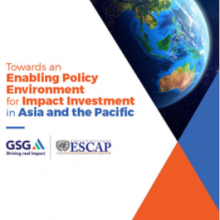Towards an Enabling Policy Environment for Impact Investment in Asia and the Pacific

Towards an Enabling Policy Environment for Impact Investment in Asia and the Pacific
This report provides a snapshot of current policymaking for impact investing in the Asia-Pacific region. It is aimed at policymakers and wider stakeholders seeking to engage with governments to promote meaningful change in the impact policy space. It is meant to act as an educational piece and conversation opener, rather than as a prescriptive or a rigid road map for implementation. The major aim of this effort is to inspire governments to address the most pressing challenges they face mobilizing impact capital and private actors.
Impact-oriented companies, striving for sustainability and inclusivity, can contribute strongly to the Agenda 2030. To scale up their positive impact, they need more investment capital. If only a small part of the $51 trillion in assets that financial institutions manage in the Asia-Pacific region was targeted towards initiatives that contribute to the UN Sustainable Development Goals, these could be achieved by 2030.
Impact investing, made with an intention to generate positive, measurable impact alongside a financial return, plays a crucial role in such regards. To unlock its potential for channelling private capital towards societal objectives, governments can create an enabling policy environment. This report, developed by the UN Economic and Social Commission for Asia and the Pacific (ESCAP) and the Global Steering Group for Impact Investment (GSG), showcases how impact enterprises and the impact investment ecosystem can benefit from innovative policy practices in the Asia-Pacific region.
Making companies investment-ready
Impact-oriented companies often lack the necessary funding, capacity and entrepreneurial skills to become investment-ready and scale their impacts. In such regards, they can receive support from governments’ initiatives that educate and encourage potential impact entrepreneurs and increase the capital available for them.
For instance, the Singapore Centre for Social Enterprise (raiSE), backed by the Ministry of Social and Family Development, fosters the development of the social enterprise sector in Singapore by providing multiple services to its more than 400 social enterprise members. This includes grants (nearly $2 million in 2018/19), capacity-building initiatives, physical co-working spaces and raising public awareness about the work of social enterprises.
Improving access to funding
In terms of funding, governments around the world continue to be predominantly focused on traditional input-commissioning schemes, limiting the scalability and hindering innovation of impact-oriented companies. However, pay-for-success mechanisms are increasingly being adopted, particularly social impact bonds (SIB). Such bonds represent a win-win solution for impact enterprises, governments and impact investors.
Government SIB schemes bring in impact investors who provide flexible funding to high impact programmes run by social sector organizations. Financial returns are tied to the delivery of measured social outcomes. Only if these outcomes are achieved, the Government repays the investor, adding a return for the risks they took.
Some examples include the women’s livelihood bond in Cambodia, the Philippines and Viet Nam (supported by USAID and DFAT) and the Social Outcome Fund, launched by Agensi Inovasi Malaysia. The increasing adoption of pay-for-success mechanisms is a crucial part of the transition towards impact economies, representing a major lever to create a market for impact enterprises and impact investors.
Removing legal and administrative barriers
Other barriers for impact-oriented companies and investors are usually found in existing administrative and legal structures. For instance, social enterprises often do not find a fitting legal form to register under. Meanwhile, institutional investors are often constrained by existing regulation requiring them to only optimise risk and financial return. Governments can remove such barriers by mandating the consideration of environmental and social issues in their investment decisions. They can also offer financial and other incentives to reward impact enterprises and investors.
In Viet Nam, social enterprises that meet specific criteria can benefit from certain incentives like preferential import and export taxes, exemption from paying income tax for four years after they start generating taxable income and paying an income tax at 10% (as opposed to the usual 20%). The Government of Viet Nam made this possible by defining social enterprises as a special category under the Enterprise Law. Similarly, Thai social enterprises can receive financial incentives through the Royal Decree on Tax Exemption (2016), as part of Thailand’s legal framework to promote social enterprises.
For more information on how impact enterprises can benefit from different government policy tools and more case studies of the Asia-Pacific region, please see the full report Towards an Enabling Policy Environment for Impact Investment in Asia and the Pacific published in December 2020.